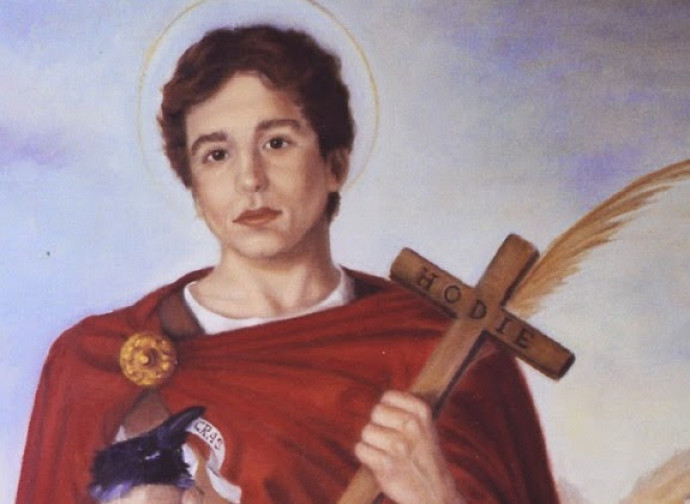Saint Expeditus
His iconography has rendered the various hagiographic accounts with very suggestive symbols.

If St Jude Thaddeus and St Rita of Cascia are particularly invoked for impossible causes, St Expeditus, the most popular of the Martyrs of Melitene, is similarly venerated as the saint of urgent causes par excellence. The most important information about him can be found in the Hieronymian Martyrology, which was originally written in the first half of the 5th century. Thanks to it we know the day of his martyrdom, 19th April, and the place, Melitene (present-day Malatya, Turkey), the site of an ancient legionary fortress, where Expeditus was martyred together with St Hermogene and other Christians. In Arminia Militana civitate Hermogeni, Gagi, Expediti, Aristonici, Rufi, Galatae una die coronatorum, reads the Hieronimian Martyrology.
The most widespread tradition reports that he was a contemporary of Saint Philomena (c. 290-302), the very young Christian martyred at the behest of Diocletian, who was also the patron saint of impossible causes. Expeditus is also mentioned as commander of the XII Roman Legion, known as the Fulminata (it had been formed by Julius Caesar and was active until the 5th century), which guarded the crossing of the Euphrates at Melitene. Iconography shows him always dressed as a Roman soldier. His name, Expeditus, which in Latin means 'free from encumbrances, free from burdens' (in Greek it means 'ingenious'), probably inspired the essential features of his depictions, which are devoid of heavy weapons and armour, since in military terminology expediti were light infantrymen.
His iconography has rendered the various hagiographic accounts with very suggestive symbols. It is said that Expeditus had known the story of Jesus for a long time and that the teachings about eternal life, the way of the cross and the Resurrection moved him. Nevertheless, the soldier had delayed his conversion time and time again, perhaps because it conflicted with what the empire demanded of soldiers in times of persecution. When Expeditus finally decided to follow Christ, the devil appeared to him in the form of a raven, inviting him to postpone his conversion until the next day.
But the saint answered decisively: "I will be a Christian today!". This is why he is depicted in various icons in the act of trampling on a crow crying cras ("tomorrow", in Latin), while in one hand he holds a cross bearing the word hodie ("today") and in the other the palm of his martyrdom, which presumably took place by decapitation around 303.
His cult was already widespread in the Middle Ages, as demonstrated by the fact that there was already a district in Turin dedicated to Sant’Espedito. From the 16th century onwards, we have multiple attestations of his veneration, which is now present in several countries in both Europe and Asia, and very popular in Latin America. His name, reminiscent of rapidity, has favoured the spread of patronage in urgent cases and over the centuries he has also been invoked to resolve legal disputes and the success of examinations. On the basis of a well-established tradition, in 1781 Pius VI proclaimed him protector of merchants and seafarers (because they needed to do business quickly or save themselves from sudden dangers). But his figure is important above all for the beautiful example of conversion, which Saint Expeditus decided to carry out without heeding the voices that tried to dissuade him. Perhaps he may have been inspired by Jesus' final teaching in the parable about the ten virgins: "Watch therefore, for you know neither the day nor the hour" (Mt 25:13).
Patron saint of: emergencies, merchants, navigators
